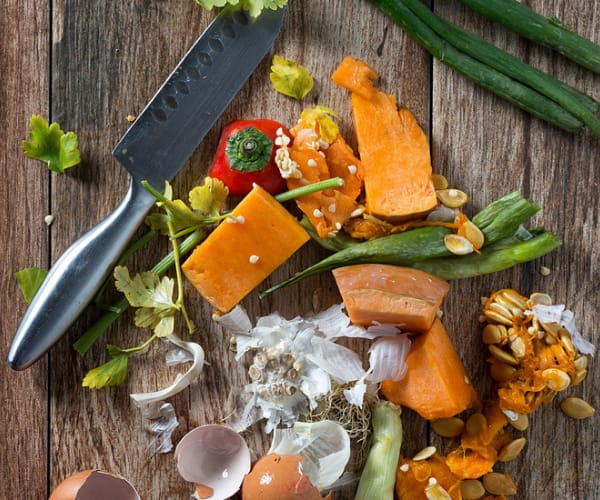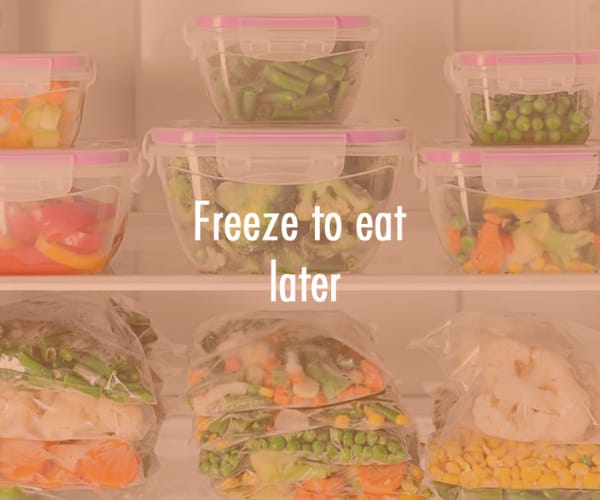Fox Resorts shares tips on reducing food waste to commemorate International Day of Awareness of Food Loss and Waste.
Stick to your shopping list! It is said that the worst time to go grocery shopping is when you’re hungry. Everything on the shelf suddenly seems enticing until you get home and realise you don’t need half the goodies you’ve bought. My tip? Stick to your shopping list and hit the grocery store after you’ve had your lunch! Remember, keeping to your list saves food and saves money.
Make sure you use up your groceries. Take a cue from every good accountant, and adopt the FIFO method of inventory management: first in, first out, using older products first and the newer ones second.
Stack your food in a way that you keep the older products ahead of the newer ones. This can prevent you from having to throw out soon-to-expire products at the back of the shelves. Look through your pantry cupboards regularly, and before you go shopping, to remind you what you have – it’s a great way to make your shopping list smaller, as well. The same goes for your freezer, where spending a few minutes checking stock will ensure your frozen items get used and not forgotten.
Use your leftovers. Food remaining on plates, or food that you just know won’t be consumed, can be collected and put out for community animals – these could be birds, crows, squirrels, or stray cats and dogs. Do remember that feedings should be done in a safe space where the animals can consume the food away from speeding cars and angry neighbours. Please clean up any remaining food and serving papers or bowls to ensure the practice doesn’t result in a different form of environmental pollution.
Compost your waste for thriving plants. Kitchen waste (vegetable peels, bones, etc.) can easily be composted for garden fertilisers. To speed up the decomposition, use a compost bin, readily available in garden and hardware stores. By composting food waste, you contribute to the circular economy, ensuring all forms of creation in your possession are gainfully utilised or flow back into the biosphere rather than simply discarded.
Freeze your excess food for a snack down the road. If you have a lot of excess food after a meal, and you don’t like eating the same food two days in a row, freeze the excess in separate containers for a treat on a later date. When packing food for freezing, make a mental plan for how you will consume it, and divide it up into containers accordingly.
Learn to love your leftovers. Tossing out leftover food is a mistake. Some food, like curries or pizza, can taste even better a day later! Keep in mind, it is vital to store leftover food properly in the refrigerator. Hot, humid climates and cooked food are extremely inviting to bacteria. To ensure no one gets sick, refrigerate your leftovers as appropriate.
Party leftovers in large quantities can be boxed up in small portions and given to your own guests to enjoy the next day, or you can foster some neighbourly relations and distribute them among your neighbours. If you have enough, please consider sending them to your neighbourhood orphanage or any other needy people in your area. If the food is being sent at a later time or the next day, please ensure that they are stored appropriately to avoid contamination.
You can always find creative ways to spruce up your leftovers! Below are some easy recipes and ideas shared by our Chefs to help you turn your leftovers at home into something a little more exciting.
Leftover Bread
There are two things you can do with leftover bread, one, a savoury breakfast muffin and the all-time leftover classic, bread pudding.
Here are Chef Nonis’ instructions to make a Savoury Breakfast Muffin:
• Preheat oven to 180 °C
• Cut the crust off the bread
• Take a rolling pin and roll each slice of bread as thin as you can
• Butter both sides of the bread
• In a muffin tray, place the bread to take the shape of the muffin cup and act like a muffin cover
• Chop up some bacon or sausages, fry it and add to the bottom of the bread cup
• Crack an egg into a separate bowl and then add on top of the bacon/sausage and season (one egg per cup if the cups are deep enough, if not whisk the eggs in a jug and pour to the top of each bread cup)
• Add some grated cheese on top and put it into the oven for about 15-20 minutes or until the egg is cooked to your liking
• Once out of the oven, sprinkle some chilli flakes and enjoy!
TIP: Store your bread in the refrigerator once you buy it. This helps it stay fresh and moist for longer without drying out.
The family favourite, Bread Pudding, is just as easy. Fox Jaffna’s Chef Regi Rageswaran shares his secret recipe:
1 loaf bread (about 2 days old)
4 eggs
1/2 Litre fresh milk
100 g Butter
200 g Sugar
1 teaspoon Vanilla Essence
• Break up the bread into pieces and add into the bowl with melted butter, milk, sugar and vanilla essence
• Add one egg at a time and mix until well incorporated
• Pour the mixture into an oiled baking dish and bake in a 180c oven for approximately 20-25 minutes or until a skewer comes out clean
• Serve with custard and eat warm
OR
• Steam in a breudher pan / round tray and serve cold with butter
• A little bit of Plums and Cashew halves add very rich flavours to the steam pudding
Rice
If you have cooked extra rice for the day, store it well in the refrigerator for the next day or the next meal. Leftover rice can be used to make any kind of fried rice. The easiest would be an egg fried rice.
Fox Kandy’s Chef Nonis’ Egg Fried Rice
• Heat an appropriately sized saucepan on a medium heat
• Add a teaspoon of your desired oil - coconut oil gives a great flavour
• Crack 2 eggs into a separate bowl and add into the pan and season
• With a wooden spoon, stir the egg gently until its cooked halfway
• Add the rice and mix well
• Add a teaspoon of soy sauce, a teaspoon of fish sauce
• Taste and add salt if necessary
• Remove from heat
• Serve and eat immediately
Chef Regi Rageswaran’s Red Rice Kanji (Palam Kanji)
It’s as easy as ever, and doesn’t involve any cooking!
• Add water into the pan in which the rice was cooked and leave overnight(water to rice 2:1 ratio). You can also transfer rice and water into a clay pot for better flavour.
• Add thick coconut milk the next morning (1 cup for each cup of rice), along with chopped green chillies and onions with salt and lime to taste
• Serve in a deep plate with lime pickle and fried curd chillies (green chillies boiled in curd and dried)
Roasted meats
Any leftover meat can be stripped and sandwiched with some butter & mustard cream for extra zest. Add sliced cucumber, tomato or some lettuce for some mineral goodness.
Fruits
Got fruits that are about to go bad?
i.e. Passionfruit, Strawberries, Mango, Orange, Pineapple. Freeze them.
Or Stew them with a few teaspoons of water and sugar to taste. This will make a great topping for the cheesecake.
Or Freeze them along with water in an ice cube tray and add them to your water or drinks.
Let’s help reduce food waste, enjoy, and appreciate our leftovers with a little help from some other ingredients!
Happy cooking!
Here are some facts about the importance of reducing food waste:
The global population is 7.7 billion. All the farmers from across the world combined, produce food to feed 10 billion people, which is almost 1.5x the current world population. And yet 690 million people, 8.9% of the world population, suffer from hunger. One of the primary causes is the large amounts of wasted food. A staggering total of 1.3 billion tonnes of food is wasted each year and accounts for nearly 40% of the food produced!
Lower-income countries have been identified as having higher levels of food wastage due to the lack of appropriate storage and little knowledge on how to keep food for longer. By contrast, in more developed countries with easy access to food and the ability to spend more lavishly on groceries, people tend to make larger portion sizes, leading to more wastage and less pressure to save leftovers.
Producing such large quantities of food, of course, uses up one of the earth’s most valuable and scarce resources –freshwater. Agriculture uses 70% of global freshwater withdrawals. According to the Food and Agriculture Organisation of the United Nations (FAO), nearly 15,000 litres of water is needed to produce just one kilogram of beef.
Food production is also one of the largest polluters in the world: more than cars, trains, or planes combined. With methane gas from cattle, nitrous oxide from fertilisers, and carbon dioxide emissions, the farming industry accounts for over a quarter of the world’s greenhouse gas emissions.
One of the goals of the United Nations Sustainable Development Goals is to have “Zero Hunger by 2030”. However, if the current trends continue, the world will have close to 840 million people who will be affected by 2030. Currently, 135 million people suffer from acute hunger. Due to the COVID-19 pandemic and its associated reduction in economic productivity, this number is expected to double.
Managing and optimising food usage, agriculture, and waste is key to the ongoing sustainability of our planet’s most vital resources. Fox Resorts employs a number of sustainability methods, including careful inventory management, use of compost for our gardens, and boiled and filtered water rather than plastic bottles. We hope that you’ll employ some of our tips on food sustainability in your own homes and help drive sustainability across the globe.
Fox Resorts is a luxury boutique chain of hotels that is committed to contributing to the sustainable well-being of people, society, and our Planet Earth.




0 Comments